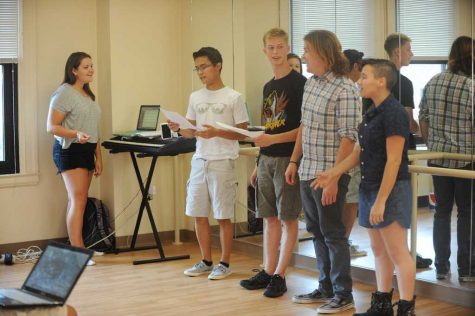Robert Browne Gartei burst through the fifth floor doors of the William Pitt Union looking more nervous than excited. This was Browne Gartei’s second time in three years trying out for a Pitt a cappella group. He clutched his head and jumped up and down as he exited his Pitches and Tones tryout.
Browne Gartei had previously tried out two years ago but didn’t make it — and now, as a senior, he wanted to take advantage of his last chance to be a part of the musical community at Pitt.
Although Browne Gartei expressed his emotions loudly, the rest of the fifth floor was quiet. Students — both veterans and aspiring members — chatted and filled out application forms for a cappella groups. Some students appeared confident and relaxed, while others were visibly nervous. One by one, each hopeful was called into a private room for their chance. Walking through the halls with uncertain steps, the potential newbies went from room to room, trying out for one group at a time.
From Aug. 31 through Sept. 3, Browne Gartei and between 150 and 200 other students, not including walk-ins, signed up for a five to 10 minute tryout for one of about 20 spots in each of Pitt’s six co-ed a cappella groups. A cappella is a type of singing — recently popularized by “Pitch Perfect” in 2012 — in which people arrange songs to be performed using only their voices. Aside from Pitt’s co-ed groups, there is also one male-only group and one female-only ensemble.
Browne Gartei said he was going to try out for every group he could.
“I have a passion for singing, and I can’t ever give it up,” Browne Gartei said. “Every time I see a performance, it makes me want to try out again, even though I know I’m going up against better competition.”
This year, Browne Gartei hoped his auditions would go better than they had in the past. He sang John Legend’s “All of Me” for his solo performance confidently, but afterward, said his falsetto fell flat. He adjusted his tape-covered glasses while lamenting over his missed notes, but remained positive.
“Despite my nerves, every group is extremely nice and welcoming and makes me want to join,” he said. “And even if I don’t get in, I know it’s not because of any negative attitudes toward me.”
Moments later, Browne Gartei heard a powerful male voice bellowing a ballad down the hall and laughed with a sigh.
“So I feel like he just took my spot,” he said. But with his spirits still high, he walked off to his next audition with Pittch Please, the all-male a cappella group.
Fortunately, for students like Browne Gartei, singers are allowed to keep their options open.
“You can try out for as many as you like or as few as you like. It’s really just about what’s the best fit for you,” Tom McIntyre, a junior linguistics major and president of the Songburghs, said.

The a cappella members holding auditions take nerves into account when choosing their favorite candidates, so they try to keep things light. Dylan Klein-Denk, a 2014 Pitt graduate and former member of C Flat Run, said C Flat Run always asks about unique, nonmusical special talents on the sign-up forms “to get to know people a bit more and to loosen them up.”
“That’s a big challenge in auditions because it can be intimidating for one person to sing in front of five to seven people,” Klein-Denk said.
C Flat Run isn’t the only group that uses this strategy. The Pitt Pendulums pay just as much attention to personality as to musical ability.
“Of course we look for good voices,” Nasia Christogianni, president of the Pendulums, said. “But we’d rather have someone with a good voice who fits in with the group than someone with the best voice ever that doesn’t get along with everyone.”
One way the Pendulums find out who will fit best with the group is by asking, “If I opened your perfect refrigerator, what would I find?”
For the Pendulums, the experience of a cappella is about more than just singing.
“Over the year, we become a singing family. We’re more than an a cappella group. We just love sharing and making music together,” Kristin Arbutina, a member of the Pendulums and senior majoring in chemistry and studio arts, said.
The group also looks for students who are eager to learn. Cole Boillat, music director of the Pendulums, said students don’t have to be able to read music perfectly to join a group.
“Hopefully you’re an expert singer,” the sophomore joked. “But you don’t have to be an expert in everything else as long as we can teach you.”
Practices during the semester usually run for two hours at a time, twice a week. Unlike the characters in the movie “Pitch Perfect,” Pitt’s a cappella singers don’t have to do cardio — but the groups have other secrets to tune up their vocal chords.
“We spend the first half hour warming up and working on technical skills like vowel matching,” McIntyre, of the Songburghs, said. “The next hour we split up by sections and learn parts to a song, usually with a break halfway through. Then the last half hour we bring it all together to figure out the larger scale items, like dynamics and blending. Then we talk about business.”
Students looking to join one of the many groups on campus seem to understand this feeling of camaraderie.
Dan Harper, a freshman engineer from Hilton, New York, auditioned for five different organizations. The soft-spoken blond said he thought joining one would help him meet more people on campus. After singing “Stacy’s Mom” by Fountains of Wayne for his prepared solos, Harper said he thought the auditions went “OK.”
“If I could just make one group, that’d be great,” he said.
As it turns out, he did. The Songburghs accepted Harper as one of six new members on Sept. 7, according to an announcement on the group’s Facebook page.
“They told me I was accepted into the group and were excited by my audition, and that I’d be getting a bunch of friend requests from members soon,” Harper said. He heard from the Songburghs on Sunday via phone call after waiting patiently all week long to hear back from all five auditions.
“I’m really excited,” Harper laughed. “I’m looking forward to meeting new people and being part of the group and having fun.”
Browne Gartei, however, did not make it into any group.
“Unfortunately I did not make it,” he said quietly. “It was really competitive this year.”
As for the Songburghs, with eight current members, the group was looking to expand to 15 to 20 people. After this year’s auditions, the group stands at 14 strong. Similarly, C Flat Run also has eight returning members and was aiming to grow to 15 to 17 members. Currently, the group has 16 members. The groups usually allow members to be in more than one a cappella or singing organization on campus, and they usually schedule practices to accommodate cross-membership.
Each group is unique in its own right, but they often perform and interact with one another.
“We’re all pretty friendly, and we do concerts together, like the Halloween concert where all of the groups on campus will be singing together. And then we’ll do gigs here and there with other groups,” McIntyre said. “And then there’s the [International Championship of Collegiate A Cappella] when everyone will go and sing, and that’s when it gets competitive.”
Although the friendly environment and ICCA competition are the same, McIntyre said they don’t have sing-offs in outdoor pools like the characters of “Pitch Perfect.” Christogianni of the Pendulums said the movies aren’t completely off the mark, though.
“It’s brought light onto a cappella and gotten more people thinking that a cappella is cool rather than nerdy,” Christogianni said.


